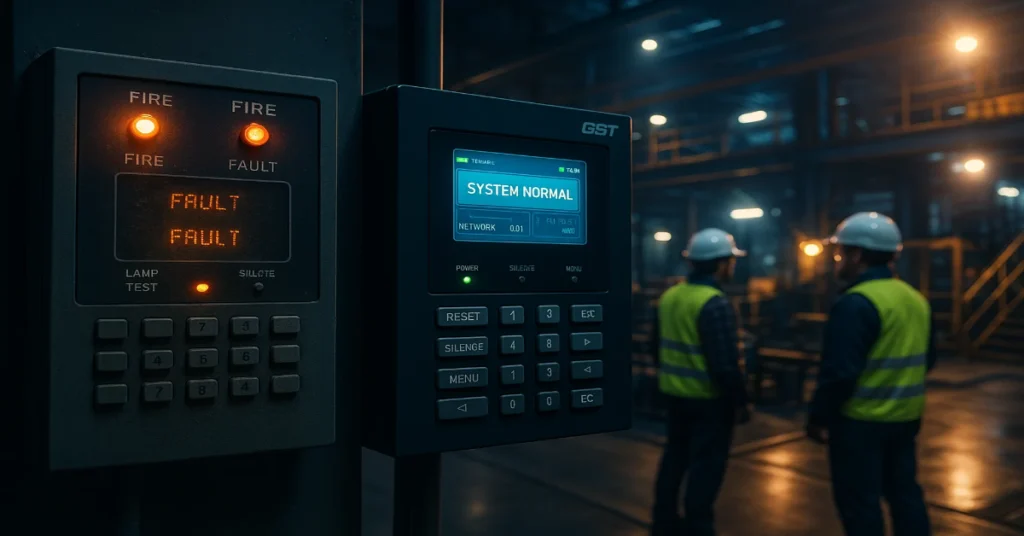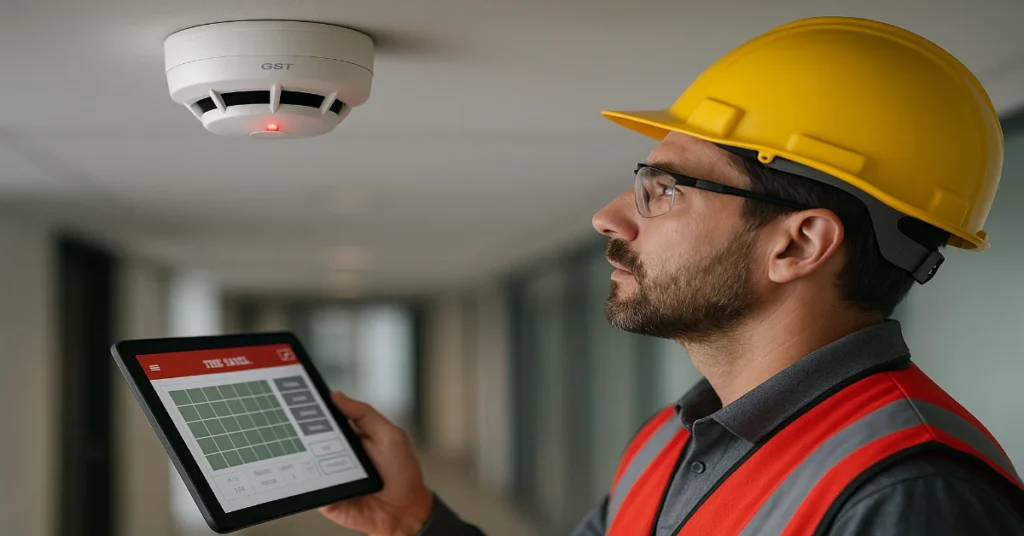Old Fire Alarm Panels Causing Downtime? Here’s Why You Should Upgrade to GST

In many industrial and commercial buildings, fire alarm systems are considered “install-and-forget” equipment. Once installed, they are rarely checked, until a false alarm shuts down operations, a fault triggers, or a fire incident occurs. Outdated fire alarm panels are one of the biggest hidden causes of downtime, unnecessary evacuation, maintenance costs and compliance failures. If your facility is still running on old or conventional fire alarm panels, this article will show you why upgrading to GST (Gulf Security Technology) Addressable Fire Alarm Panels is not just a smart decision but a necessary step toward eliminating downtime and improving safety. GST is a globally recognized fire alarm manufacturer with installations in over 100+ countries, known for reliability, advanced addressable technology and easy integration. Quick Summary Problem with Old Fire Alarm Panels Solution with GST Addressable Panels Frequent false alarms Smart address detection reduces false alarms Hard to find location of fire/fault Exact device address and location displayed Limited expansion Modular and scalable system up to thousands of devices Slow maintenance response Automatic diagnostics from GST panel Non-compliance risks Compliant with global standards (EN54, UL, LPCB etc.) 1. The Hidden Cost of Old Fire Alarm Panels Old or conventional fire alarm systems may still function, but they come with major limitations: The result: ❌ Lost production hours❌ Panic among employees❌ Increased maintenance cost❌ Safety and compliance risks In industrial settings like power plants, data centres, refineries, manufacturing units, airports and hospitals, downtime caused by false alarms can mean losses of lakhs to crores. 2. Why GST Panels Are the Solution to Downtime GST’s addressable fire alarm panels, especially the GST 200N, IFP8 and GST 100 Series are designed to minimize downtime and give real-time visibility of the entire fire system. ✅ GST Panels Can Identify the Exact Device Triggering Alarm Instead of showing “Zone 1 Fire”, GST displays: “Smoke Detector – Loop 1, Device 034 – AHU Room (2nd Floor)” This means: ✅ Automatic Troubleshooting & Diagnostics GST continuously monitors: Maintenance teams get instant fault notifications, reducing time spent on troubleshooting. ✅ Smart Fire Detection & Faster Response Time GST integrates advanced algorithms that monitor: This helps detect real emergencies, not dust-triggered alarms. 3. The Biggest Pain Point of Old Panels: False Alarms False alarms lead to: According to NFPA, nearly 32% of industrial false alarms are caused by outdated detectors and panels. GST solves this with: Instead of random triggers, GST evaluates smoke patterns before generating alarms. 4. GST Eliminates Troubleshooting Guesswork Imagine having 400 smoke detectors in a plant. With an old panel: With a GST addressable panel: This is a major reason engineers prefer GST systems for large industrial projects. 5. Scalability: Grow Without Replacing the System Old systems are rigid and fixed in capacity. GST offers: Feature Old Panels GST Panels Expansion ability Limited Highly scalable & modular Device identification No Yes (unique address for each device) Future integration Difficult Supports BMS, networking, IP integration Networkability Not available Up to 64 panels networked Whether you have 10 detectors or 20,000, GST allows scaling without changing the main panel. 6. GST Panels Support Modern Integrations To meet modern building needs, GST provides: This is crucial for: 🏭 Industrial automation🏢 Commercial complexes🌐 Multi-building campuses 7. GST Helps Achieve International Safety Compliance Many older fire alarm systems do not comply with current fire regulations, especially in industrial facilities. GST products conform to: Compliance not only improves safety, it helps in insurance and audit approvals. 8. Reduced Maintenance and Operating Cost With GST: Most facilities recover the upgrade cost in 1–2 years through reduced downtime alone. 9. Case Study: How GST Saved 4 Hours of Production Downtime A manufacturing plant had constant false alarms from their old panel. After switching to GST 200N: Before GST Upgrade After GST Upgrade Avg. downtime per false alarm: 4 hours Downtime reduced to 15 minutes Manual fault hunting Auto fault detection Multiple shutdowns per month Zero false alarm shutdowns Engineers reported an improvement in system reliability and maintenance efficiency. 10. When Should You Upgrade to GST Panels? You’re due for an upgrade if: If your fire alarm system is over 10 years old, upgrade becomes a necessity. 11. GST Models Recommended for Industrial and Commercial Use GST Model Best For Advantage GST 200N Factories, warehouses, malls High loop capacity, networking GST IFP8 Large industrial sites Multi-loop with redundancy GST 100 Series Offices, small-medium buildings Cost-effective and addressable Upgrading to GST Is an Investment, Not an Expense Old fire alarm panels increase downtime, risk and operational cost. Upgrading to GST: If you want to avoid losses from false alarms and downtime, switching to GST is the most practical solution. Read Also: Top 10 Site Issues Fire Engineers Face (and How GST Panels Fix Them) Read Also: Top 5 Reasons Engineers Prefer GST Detectors Over Generic Brands
Top 5 Reasons Engineers Prefer GST Detectors Over Generic Brands

In fire safety engineering, detectors are the first line of defense. They sense the earliest signs of smoke, heat, or flame and alert the system before a small incident turns into a major disaster. However, not all detectors perform equally and that’s why most engineers prefer GST Detectors over generic brands. GST (Gulf Security Technology) has become a trusted name in the fire safety industry, known for its advanced detection technology, reliability and engineering precision. In this article, we’ll explore the top five reasons engineers choose GST detectors for industrial, commercial and residential applications and why these detectors consistently outperform generic alternatives. 1. Proven Reliability in Critical Environments When it comes to fire detection, reliability is non-negotiable. Engineers know that even a few seconds of delay or a single false alarm can have costly consequences. GST detectors are designed to deliver uncompromised performance in all conditions, from high-temperature industrial sites to clean office spaces. High Stability and Accuracy GST detectors use advanced sensing algorithms and multi-criteria detection technology that minimize false alarms while ensuring fast response. Unlike generic detectors that rely on basic optical or ionization methods, GST’s intelligent detectors analyze multiple parameters simultaneously, such as: This ensures consistent performance even in dusty, humid or high-airflow environments, conditions where generic detectors often fail. Engineered for Harsh Conditions GST detectors undergo rigorous environmental testing for temperature, humidity and vibration. Engineers trust them because they comply with international fire safety standards like: Such certifications prove that GST detectors are not just built to perform, they’re built to last. In short: GST detectors provide the reliability that industrial engineers can confidently design into their fire safety networks without worrying about inconsistent performance. 2. Advanced Addressable Technology and Smart Features Another key reason engineers prefer GST detectors is their intelligent addressable technology. In modern fire detection systems, every device must communicate clearly with the control panel and GST excels at this integration. Unique Addressing for Easy Identification Each GST detector has a unique digital address, allowing the fire panel to pinpoint the exact location of a trigger. This means that during an alarm, the panel can display: Generic detectors, on the other hand, often rely on conventional wiring loops that can only indicate an alarm in a general zone, wasting valuable response time. Smart Communication with GST Panels GST detectors integrate seamlessly with GST addressable fire alarm panels such as the IFP8, 200N Series, or IFP4E. Through the GST protocol, they exchange real-time data, allowing: These features help engineers design systems that are not just reactive but proactively intelligent, reducing maintenance workload and improving system uptime. Ease of Configuration and Testing Engineers also appreciate GST’s plug-and-play configuration. Devices can be programmed via handheld units or software tools, minimizing installation time. In contrast, generic brands often require manual calibration, which increases the risk of setup errors. In short: GST detectors make the entire system smarter, faster and easier to maintain, something that every engineer values. 3. Comprehensive Product Range for Every Application Fire engineers often work on diverse projects, from data centers and hospitals to power plants and shopping malls. GST offers a complete range of detectors tailored for each environment, allowing engineers to design customized and compliant systems without mixing multiple brands. Types of GST Detectors Custom Engineering Flexibility Each detector can be integrated into a single-loop or multi-loop addressable network. Engineers can choose configurations based on building layout, occupant type or hazard class, ensuring compliance with NFPA, BS or local fire codes. Generic brands, in contrast, usually offer limited models without consistent performance or cross-compatibility. Engineers often face difficulties mixing and matching products, leading to inefficiencies and certification challenges. In short: GST’s wide product lineup empowers engineers to meet any fire safety requirement with one trusted ecosystem. 4. Lower Lifetime Cost and Easier Maintenance Engineers think beyond initial installation, they consider total cost of ownership (TCO). While generic detectors may seem cheaper upfront, they often cost more in the long run due to false alarms, sensor degradation and frequent replacements. Reduced False Alarm Rates False alarms are one of the biggest pain points for fire engineers. They disrupt operations, cause unnecessary evacuations and erode trust in the system. GST detectors, with their intelligent algorithms, drastically reduce false alarms, which: Easy Maintenance and Self-Diagnostics GST detectors feature self-testing and fault reporting functions. When dust or aging affects performance, the system alerts maintenance teams automatically. Engineers can easily perform loop tests or isolate faulty devices without shutting down the entire system. GST also provides software-based maintenance tools that simplify periodic inspection and reporting, a major advantage in large facilities with hundreds of devices. Longevity and Warranty Support Built with industrial-grade components, GST detectors have a long operational life. The company’s global service network ensures warranty support and quick spare part availability, which further reduces maintenance downtime. In short: GST detectors deliver long-term value through reliability, intelligent diagnostics and minimal false alarms, all key reasons engineers prefer them over cheaper generic alternatives. 5. Strong Global Brand with Trusted Support Network In fire safety, brand trust matters as much as technology. Engineers need assurance that the products they specify will be supported for years to come. This is where GST stands apart from generic brands. Global Presence and Certifications GST is a globally recognized fire detection brand with presence in over 100 countries. It’s part of the Carrier Group, one of the world’s leading providers of building safety and automation technologies. Engineers trust GST because it’s backed by decades of R&D, certified manufacturing and a proven global track record. Technical Support and Training GST provides engineers with: This level of support ensures that every fire detection project is installed correctly and maintained to international standards, something generic brands rarely provide. Local After-Sales Service In regions like India, the Middle East and Southeast Asia, GST has an extensive distributor and service network. Engineers can access prompt technical help, replacement parts and site commissioning support, ensuring long-term reliability of the system. In short: GST’s strong global backing and
